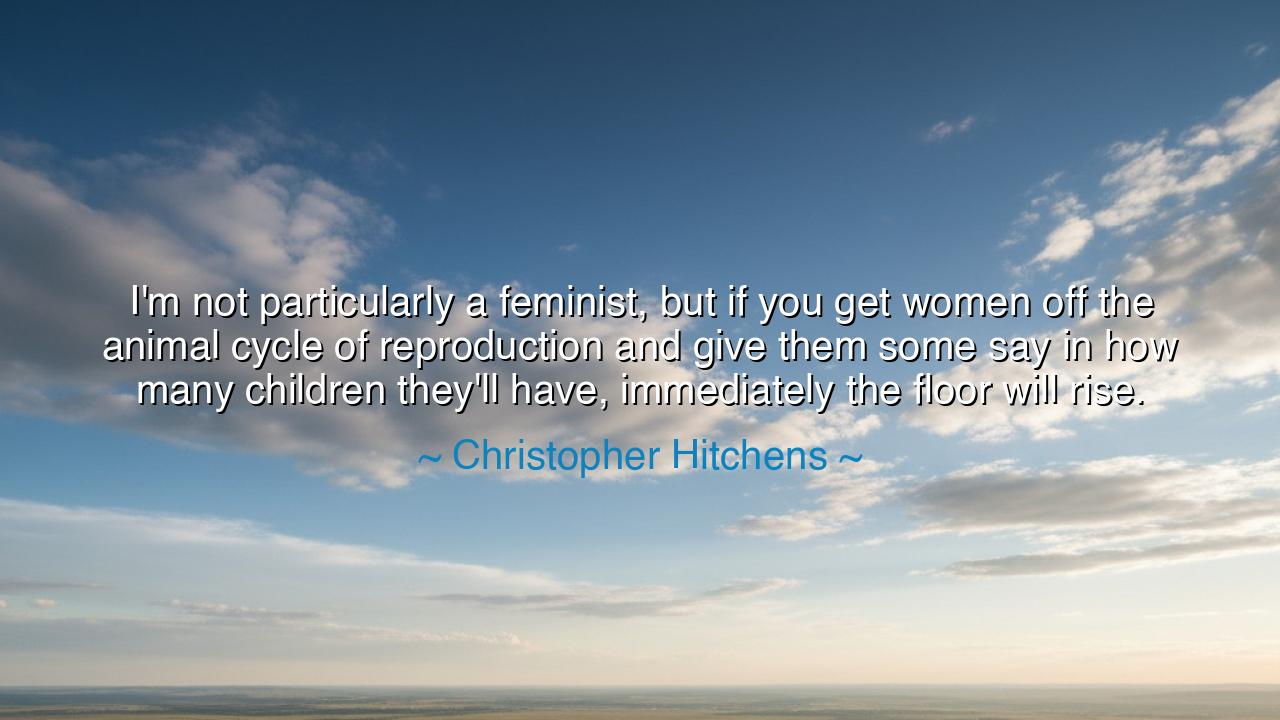
I'm not particularly a feminist, but if you get women off the
I'm not particularly a feminist, but if you get women off the animal cycle of reproduction and give them some say in how many children they'll have, immediately the floor will rise.






The words of Christopher Hitchens, “I’m not particularly a feminist, but if you get women off the animal cycle of reproduction and give them some say in how many children they’ll have, immediately the floor will rise,” strike with candor and clarity. In them lies the recognition that freedom begins with control over one’s own body. For when women are chained to endless childbearing without choice, their strength is spent in survival alone. But when they are granted sovereignty over their reproduction, they rise—and with them, all of society rises too.
In the ancient spirit, this truth recalls the wisdom of civilizations that flourished when women shared in power and declined when they were silenced. To reduce a woman only to the womb is to bind her spirit, to waste her talents, to silence her voice. But to grant her the right to choose—to govern her own body and destiny—is to unleash half the world’s wisdom and labor. Hitchens, though wry in tone, spoke to a truth as old as humanity: that a society cannot soar while holding down its mothers, its daughters, its givers of life.
Consider the story of Margaret Sanger, who in the early 20th century fought for access to birth control in America. She saw poor women exhausted by ceaseless pregnancies, trapped in poverty with no chance for education or independence. For this cause she was arrested, condemned, and silenced. Yet her vision prevailed, and with the spread of contraception, generations of women gained power over their lives. The “floor” of opportunity rose, as Hitchens said, for families, communities, and nations.
History offers another mirror in the life of ancient Sparta, where women were given unusual freedoms compared to their Athenian sisters. They were not bound to the home alone but trained in strength and allowed to hold land. While still mothers, they were not wholly consumed by childbearing, and the strength of Sparta’s women gave the state a resilience that astonished the rest of Greece. Here too, the lesson is clear: when women are more than vessels of reproduction, the state itself grows stronger.
So let this truth endure: the liberation of women is not an act of charity, but the unlocking of humanity’s full potential. To give women choice is to elevate all; to deny it is to keep the world bound to the ground. Hitchens’ words, sharp though they are, carry the wisdom of the ages: free women, and you free the nation; silence them, and the world remains forever half-asleep.






BHBao Han
Christopher Hitchens' quote is provocative, yet it oversimplifies the complexity of women’s empowerment. While reproductive rights are essential, saying that this alone will lead to immediate progress overlooks other barriers women face. Is it realistic to assume that giving women more control over reproduction will automatically lead to societal changes? What about the ongoing challenges of gender inequality in the workplace, politics, and culture?
P9Anh Phuong 9A
Hitchens seems to acknowledge that access to reproductive freedom is a key factor in empowering women, but his phrasing implies a narrow view of what it means to 'raise the floor.' Could focusing only on reproductive rights risk oversimplifying the broader challenges women face, such as equal pay, freedom from violence, and access to leadership roles? Shouldn't the fight for gender equality go beyond reproductive freedom to encompass these other dimensions?
DHDuy Hung
This quote touches on the critical link between reproductive rights and women's societal advancement. Hitchens seems to imply that controlling reproduction will instantly lead to women's progress. But is it that simple? Should we be focusing solely on reproduction, or should we also be addressing systemic issues like education, healthcare, and workplace equality that affect women’s ability to thrive in society?
7X7A2 Xin
While Hitchens acknowledges the importance of reproductive rights, his comment seems to minimize the importance of feminism by claiming he's 'not particularly a feminist.' Is it possible to support gender equality without embracing feminism, or does the term 'feminism' inherently represent a set of ideas that Hitchens might not fully support? Could this quote be seen as undermining the very movement that has fought for the rights he describes?
TNThien Nhu
Hitchens’ statement is interesting because it highlights the power that access to reproductive rights can have on women’s lives. By giving women control over how many children they have, they gain autonomy and the opportunity to engage more fully in society. But does this diminish the importance of broader feminist issues, like equal pay and social representation? Should reproductive rights be viewed as the key to women's empowerment, or just one piece of the puzzle?